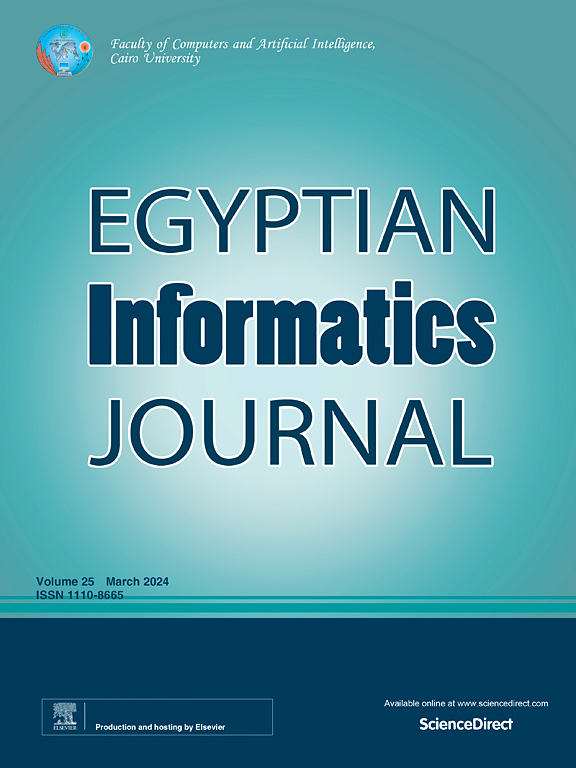LPBSA:使用先进的机器学习模型进行疾病预测的临床前数据分析
IF 4.3
3区 计算机科学
Q1 COMPUTER SCIENCE, ARTIFICIAL INTELLIGENCE
引用次数: 0
摘要
糖尿病、COVID-19和心脏病构成了重大的全球卫生挑战。本研究引入了一种优化算法,即基于学习性能的行为模拟退火算法(LPBSA),该算法与多层感知器(MLP)作为一种神经网络技术相结合,以提高疾病预测的准确性。该算法在6个临床前数据集(1个与糖尿病相关,2个与心脏病相关,3个与COVID-19相关)上进行了测试。除了LPBSA-MLP,其他优化算法,包括适应度依赖优化器(FDO),原始的学习者基于绩效的行为(LPB),都独立地与MLP结合。此外,将这三种算法与级联多层感知器(LPBSA-CMLP、FDO-CMLP、LPB-CMLP)相结合,提高了收敛速度和学习能力。这允许在不同算法配置之间进行全面比较,并能够确定最有效的疾病预测模型。LPBSA-MLP模型在4个数据集上达到100%的准确率,在其他数据集上至少达到99.31%的准确率。进一步的指标证实了其性能:灵敏度和特异性值达到100%,均方误差(MSE)值范围为0.0008至0.003。当对使用FDO-MLP、LPB-MLP和其他标准优化器训练的模型进行基准测试时,LPBSA-MLP在分类性能和收敛速度方面始终优于它们。这些发现表明,LPBSA在加强对关键健康状况的预测建模方面是有效的。本文章由计算机程序翻译,如有差异,请以英文原文为准。
LPBSA: Pre-clinical data analysis using advanced machine learning models for disease prediction
Diabetes, COVID-19, and heart disease pose significant global health challenges. The current study introduces an optimization algorithm, Learner Performance-Based Behavior with Simulated Annealing (LPBSA), integrated with Multilayer Perceptron (MLP) as a neural network technique to improve disease prediction accuracy. The algorithm was tested on six preclinical datasets (one is related to diabetes, two are related to heart disease, and three are related to COVID-19). In addition to LPBSA-MLP, other optimization algorithms, including Fitness Dependent Optimizer (FDO), the original Learner Performance-Based Behavior (LPB), were independently combined with MLP. Furthermore, all three algorithms were integrated with a Cascading Multilayer Perceptron (LPBSA-CMLP, FDO-CMLP, LPB-CMLP) to enhance the convergence speed and learning capability. This allowed for a comprehensive comparison across diverse algorithmic configurations and enabled the identification of the most efficient model for disease prediction. The proposed LPBSA-MLP model achieved 100% accuracy on four data sets and at least 99.31% on the others. Further metrics confirm its performance: sensitivity and specificity values reached 100%, and Mean Square Error (MSE) values ranged from 0.0008 to 0.003. When benchmarked against models trained with FDO-MLP, LPB-MLP, and other standard optimizers, LPBSA-MLP consistently outperformed them in terms of both classification performance and convergence speed. These findings indicate the effectiveness of LPBSA in enhancing predictive modeling for critical health conditions.
求助全文
通过发布文献求助,成功后即可免费获取论文全文。
去求助
来源期刊

Egyptian Informatics Journal
Decision Sciences-Management Science and Operations Research
CiteScore
11.10
自引率
1.90%
发文量
59
审稿时长
110 days
期刊介绍:
The Egyptian Informatics Journal is published by the Faculty of Computers and Artificial Intelligence, Cairo University. This Journal provides a forum for the state-of-the-art research and development in the fields of computing, including computer sciences, information technologies, information systems, operations research and decision support. Innovative and not-previously-published work in subjects covered by the Journal is encouraged to be submitted, whether from academic, research or commercial sources.
 求助内容:
求助内容: 应助结果提醒方式:
应助结果提醒方式:


